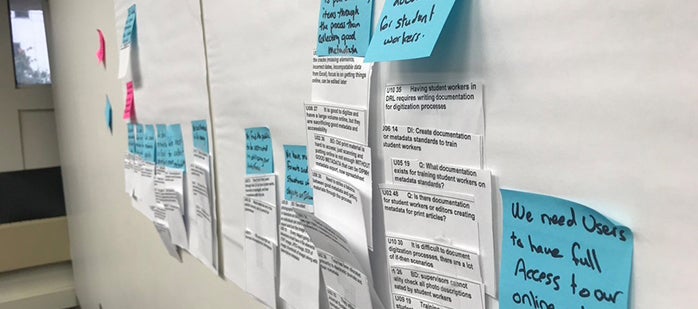What is the Design Methods Sequence?
The Design Methods Sequence (DMS) is a series of two experiential learning classes in the Master of Library and Information Science (MLIS) program at the University of Pittsburgh. The purpose of the DMS is to provide an opportunity for student teams to work collaboratively with partner organizations on projects that build the information skills of the students while at the same time supporting projects important to local partner organizations. In class, students learn a variety of design methods that can be used to address information problems and needs, then they will apply what they have learned with their partner organizations. Students spend two academic terms working with their partner organizations to address their information needs and problems, with the fall term focused on investigating a problem and the spring term focused on implementing a solution.
Since Fall 2019, student teams have engaged organizations to solve information problems using Design Thinking and Methods for a variety of partner organizations including University Library System at the University of Pittsburgh, Carnegie Mellon University Libraries, City of Asylum, Pittsburgh Commission on Human Relations, the Network of National Library of Medicine, and 2020 Census.
Example Projects
In the past year, student groups have worked with a variety of organizations on many different types of information problems.
- Create an archive of documents and processes to aid the 2030 census committee.
- Creating virtual exhibits of materials in the Health Science Library System’s digital collections.
- Developing documentation and procedures for processing email archives for the University of Pittsburgh’s Archives.
- Creating templates and processes for producing online lesson materials for the Health Sciences Library System.
- Create a communications plan, with process documentation and example messaging, for a public library to help them better reach members of their community.
What it means to participate
Partner organizations should propose projects that focus on information problems. Projects may improve a process, create a product, or design a service. Example project areas include, but are not limited to: Data and information management; Working with archival collections; Developing documentation and workflows; Managing outreach and advocacy; Integration and adoption of information systems. Student groups must be able to complete the projects in two terms.
The DMS is not an internship and project partners are not required to provide direct supervision, though partners should plan to make themselves available for interviews and meetings to share information with project teams. DMS instructors will direct student progress. However, in some cases, internship or field placements can emerge from partnership with the DMS.
In the Fall term, students will interview and observe members of your organization (and/or constituencies) to develop a rich understanding of the problem space. At the end of the term students will deliver a report with a description of the problem and recommendations for solutions.
In the Spring term, students will develop and test prototype solutions and solicit feedback from members of your organization (and/or constituencies) for iterative design processes. At the end of the term students will deliver a final product with documentation for integration.
How to Apply
If you have questions, please contact the instructional team: Matt Burton (mcburton@pitt.edu) or Chelsea Gunn (cmg100@pitt.edu). If you are interested in participating in the 2020-21 DMS, please complete this Google Form application. The instructional team will follow up with additional details.

